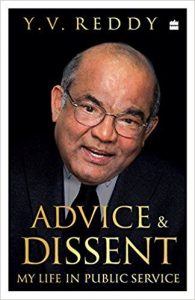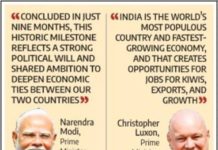http://www.freepressjournal.in/interviews/autonomy-has-to-be-grabbed-former-rbi-governor-y-v-reddy-2/1093877
Y.V.Reddy speaks about RBI ansd financial policies
— By | Jun 30, 2017 10:58 am
As he autographs his book ‘Advice and Dissent: My Life in Policy Making’ for us, Y.V.Reddy (age: 75 years), former governor of the Reserve Bank of India (RBI), explains the reason for the slight tremble in his hand. “I have got Parkinson’s,” he says and goes ahead with the signing. But his mind is razor sharp. His ability to recall events is amazing. And his understanding of the world of finance, without losing his moorings to his humble beginnings as a lad in a village, leaves his listeners both impressed and spell-bound.
 He talks about his days with the World Bank and the RBI and his journey through the corridors of power and policy-making ever since he became an IAS officer (1964 batch). Finally, Y V Reddy, who is respected for his views and his supreme negotiating skills, gets down to the business of talking about his book to Free Press Journal’s Jescilia Karayamparmbil and R N Bhaskar.
He talks about his days with the World Bank and the RBI and his journey through the corridors of power and policy-making ever since he became an IAS officer (1964 batch). Finally, Y V Reddy, who is respected for his views and his supreme negotiating skills, gets down to the business of talking about his book to Free Press Journal’s Jescilia Karayamparmbil and R N Bhaskar.
Given below are edited excerpts of those discussions
‘Sir, I added, to liven up the atmosphere, ‘autonomy’ is seldom granted. It has to be grabbed.’ What did you mean when you said that?
It has to be grabbed. The point here is how do we take it and that depends on the strategy that we embrace. You look at the window of opportunity and then grab it. One requires to negotiate one’s terms. This reminds me of one scenario that I have not written in the book. It was a situation where we were having a small talk. This was when I was an advisor to the World Bank in early 80s. I was fairly good at negotiations. It was a rare occasion when (the then) joint secretary sent me a letter stating that the finance minister has placed deep appreciation on my outstanding negotiation abilities. Here the RBI was trying to convince the World Bank officials about the estimates of BOP (balance of payments).
But RBI and everyone involved in this discussion failed to convince them. I was the advisor then and I was told (to proceed with the negotiations). So, I told the vice president (I will go through the estimates) and he told the economist to give it to me. The economist said that the vice president will permit this only after I see it. After going through them, I said “It is prefect. But, I added, there are exceptional situations in India – like parts of India might have some agitation (or some other crisis) and that (such things) are not unusual in India. In case that happens there will be a rise in prices in the country. So such things need to be taken care of and authorities are worried that they might lose money by this method. Then the economist says that no one had told him this. That is when I realised that best negotiation strategy is to tell the truth.
I kept following this strategy in various similar instances. Usually, negotiation is misunderstood as dirty manipulation. It is actually about coming to a way of thinking.
In the book, there is a conversation about P Chidambaram and you about foreign banks and some decisions that you were going to make around it. You eventually got your way…
I was able to take the decision because the then Prime Minister and Finance Minister agreed with my decision. I cannot take credit for my decision because my facts are based on the recommendations of my deputies. They should also take the credit. That is what I want to emphasise too. It is not that I won my point but it is about giving the credit to the leadership for listening to me, and actually paying heed to what I had to say. I would say that they were willing to appreciate my point of view.
Dissent is not only about my boldness to disagree. It also points to the willingness of the government to encourage dissent. Therefore, it was possible to express dissent. In some cultures and countries, dissent is not possible. In many conversations, it was said that because he was bold, he was able to dissent. That is not logical. I was encouraged to dissent and I took the opportunity to dissent. That is what resulted in good work.
You said that the 70s and 80s were the lost decades. What did you mean by that?
In the sense that by then, it was very clear that the model of development by the government was beyond the budget for funding development. Banks had already been nationalised. There was huge expansion of the resource-base through public policy.
Second, the mixed economy concept was not meant to be unidirectional expansion of the public sector. It has to be mixed as appropriate to circumstances. Unfortunately, it was unidirectional.
By the time ‘80s came, the world’s wisdom changed and technology enabled this segregation. This led to unbundling of the monopolies. Fortunately, it was recognised in India and various committees were appointed. But again as I mentioned it was a reluctant concession rather than willing acceptance of (market) economics.
Was loan mela one reason for above mentioned statement?
There are many aspects to the statement I made and loan waiver was one of them. Another aspect to my statement was how you use the additional resources made available to the banking system. Also, how productively have you used it?
What is your take on loan waiver?
It cannot be merely the economics of financial consideration. One must take into account boarder social considerations. The way it is being projected today in popular debate is, as if it is a disaster. In terms of magnitude and impact, it is significantly less than the restructuring of loans for corporates and non-transparent restructuring of the public enterprises. In a way, you cannot take a high moral ground when this happens. The beneficiaries are large number of people who at least deserve sympathy.
The whole issue is that, mentally, we take a position: that when we give it to the poor it is called subsidy and when we give it to the rich man it is called incentive. So, I would like to say it is not a good thing but largely it is not a disaster. It is not undeserved as in many cases.
You said RBI was inward looking earlier. Do you think that has changed?
Yes, it (the tendency to be inward looking) was in the past and it has changed. It was due to the culture that created a notion that private sector was considered bad and if a regulator interacts with the regulated then you are corrupt. The interaction was not the culture then. It was only during the 1991 reforms that this changed.
You wrote about the Harshad Mehta and Ketan Parekh scam. You see the banks being closed down without providing that safety net to depositors.
At that point of time, OBC was not persuaded but they were interested parties. They were one of the interested parties. They were the suitor and we selected a suitor for the takeover of GTB (Global Trust Bank of Ramesh Gelli).
There is one area that RBI does not comment on that is co-operative banks. Why so?
RBI cannot come out any more on this as it is not within their jurisdiction. Moreover, it is a segment which is not big enough to create a systemic failure.
What is your stand on participatory notes?
There is no stand. If you look at things dispassionately, all around the globe, there are lots of actions taken around anything that is non-transparent. It was more so after 2008 that a significant reform on this front took place.
What kind of influence did your childhood have during your role as a Governor?
I spend some part of my childhood in the village and schooling under the Ramakrishna mission. But after that a major part of my life was away from that. Mostly, it was away from the village but my background did have an imprint on me as an individual. In my earlier years, it brought in some form of sensitivity. My parents and school had an impact on me.
I was not part of the elite, so naturally I became part of the common masses. Many people are happy to climb out of their common background (and move into elite circles). Many others like to rebel. But in my case neither happened.
Is there any part of your book that you would like to rephrase?
I am waiting for reactions from the media. Unfortunately media is more interested in focussing more on money and finance, which forms the second part of the book. The second part is known to people around the world. I thought many people would be more interested in the first part.
I have been told that the second part sells with media, but most readers would concentrate on the first part. I am hoping the first part will get the attention of the readers. Few central bankers write more about their early life, than about money and their role as central bankers.
Having said that, so far I do not plan to rephrase anything yet but after some of the inputs I will think about it.
Do you plan to write any another book?
Actually, I do. But it would be slightly different — like writing about gold. Or about decentralisation.










































COMMENTS